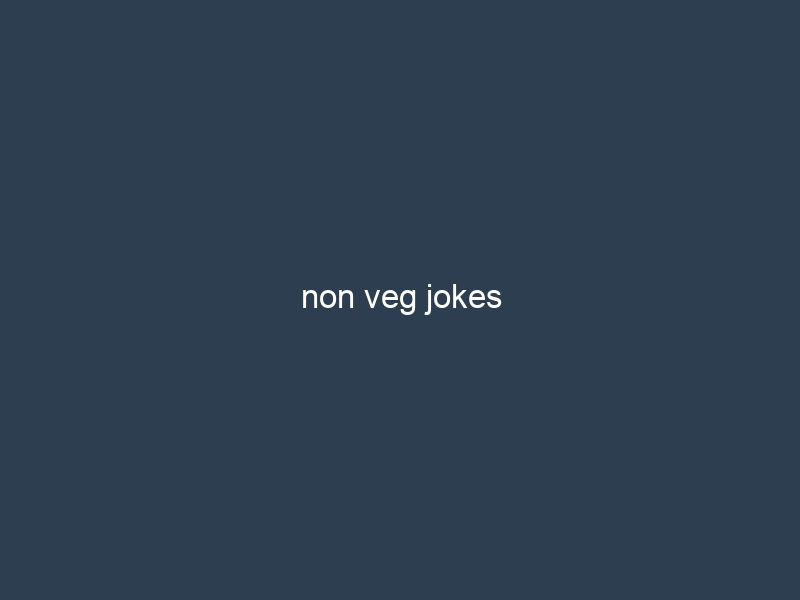The Controversy of Non-Veg Jokes: Harmless Fun or Offensive Humor?
Non-Veg Jokes have been a topic of debate for many years. Some people find them to be harmless fun, while others consider them to be offensive humor. The controversy surrounding non-veg jokes has raised questions about the impact of such jokes on society and whether they should be considered acceptable or not.
What are Non-Veg Jokes?
Non-veg jokes are jokes that contain content of a sexual or inappropriate nature. They often involve innuendos, double entendres, or explicit language. These jokes are usually considered to be crude or vulgar, and they are often the subject of controversy due to their potentially offensive nature.
The Controversy
Non-veg jokes have sparked controversy for many reasons. Some people argue that they are simply harmless fun and a way to lighten the mood. Others believe that these jokes are offensive and can perpetuate harmful stereotypes and attitudes towards certain groups of people. The debate over the controversy of non-veg jokes has been ongoing and has led to heated discussions in both social and professional settings.
Arguments in Favor of Non-Veg Jokes
Those who support non-veg jokes argue that they are simply a form of humor and should be taken lightly. They claim that humor is subjective and that people should not take offense to jokes that are meant to be lighthearted and funny. Supporters also believe that censoring non-veg jokes infringes on freedom of speech and expression.
Arguments Against Non-Veg Jokes
On the other hand, opponents of non-veg jokes argue that these jokes can be harmful and perpetuate negative stereotypes and attitudes. They claim that non-veg jokes often target specific groups or individuals and can contribute to a culture of disrespect and discrimination. Opponents also stress that non-veg jokes can create an uncomfortable or hostile environment for those who may be offended by such humor.
The Impact
The impact of non-veg jokes on society is a major point of concern. It has been suggested that such jokes could contribute to a culture of misogyny and sexism, as they often target women and their bodies. Additionally, non-veg jokes may also perpetuate harmful stereotypes about certain groups of people, leading to discrimination and prejudice.
Conclusion
In conclusion, the controversy surrounding non-veg jokes is complex and multifaceted. While some people view these jokes as harmless fun, others see them as offensive and harmful. It is essential to consider the impact of such humor on society and to engage in respectful and open-minded discussions about the topic. Ultimately, it is important to recognize that humor can have a profound effect on individuals and communities, and we must be mindful of the messages we convey through jokes and other forms of entertainment.
FAQs
Are Non-Veg Jokes Always Harmful?
While some non-veg jokes may be intended as harmless fun, it is important to recognize that they can have negative consequences. It is crucial to consider the impact of such humor on individuals and communities.
Should Non-Veg Jokes be Censored?
The censorship of non-veg jokes is a contentious issue. While some argue that censorship infringes on freedom of speech, others believe that it is necessary to prevent the perpetuation of harmful stereotypes and attitudes.
How Can We Address the Controversy Surrounding Non-Veg Jokes?
Engaging in open-minded and respectful conversations about the impact of non-veg jokes is crucial. It is important to consider the perspectives of those who may be affected by such humor and to strive for inclusivity and sensitivity.
non veg jokes
The controversy surrounding non-veg jokes is a topic that ignites strong opinions on both sides. Some people argue that these jokes are harmless fun, while others find them offensive and demeaning. The term “non-veg” refers to jokes that contain sexual or inappropriate content, often using crude language or innuendos. While some people may find these jokes entertaining, others believe that they perpetuate harmful stereotypes and contribute to a culture of disrespect.
Proponents of non-veg jokes argue that they are simply a form of lighthearted humor and should not be taken seriously. They believe that these jokes are a way to laugh at life’s absurdities and express themselves freely without censorship. Additionally, they argue that those who are offended by non-veg jokes should simply avoid them, rather than trying to censor the humor of others.
On the other hand, opponents of non-veg jokes argue that they contribute to a culture of disrespect and objectification. They believe that these jokes perpetuate harmful stereotypes about gender, sex, and relationships, and can be particularly harmful to marginalized groups. Additionally, they argue that non-veg jokes create a toxic environment in which crude and inappropriate behavior is normalized, leading to further disrespect and harassment.
It’s important to consider the impact of these jokes on others, and to recognize that what may be harmless fun to some can be deeply offensive to others. It’s important to create a culture of respect and understanding, rather than perpetuating harmful stereotypes and demeaning behavior.
Ultimately, the controversy surrounding non-veg jokes is a complex issue with no easy answers. While some people may see them as harmless fun, others find them offensive and disrespectful. It’s important to recognize the impact of our words and actions on others, and to foster a culture of respect and understanding. Whether or not non-veg jokes are deemed acceptable ultimately comes down to personal beliefs and values – but it’s crucial to consider the perspectives of others in this ongoing debate. non veg jokes




